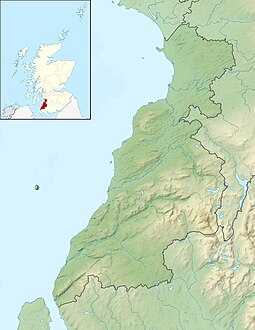Ailsae Craig
Ailsae Craig[6] (Inglis: Ailsa Craig Scots Gaelic: Creag Ealasaid) is ae isle o 99 hectare (240 acre) in the ooter Firth o Clyde, 16 kilometre (9.9 mi) frae mainland Scotland, fae whit blue hone granite wis quarried tae mak curlin stanes.[7][8] Aa the stanes uised in the Olympics come fae Ailsae Craig.[9] The stanes is honed in Mauchline across the watter, sin 1851, bi Kay's Curling, wha wir alane in uisin the granite, bi coortesy o the laird, the Marquess o Ailsa.[10]
| Gaelic name | Creag Ealasaid |
|---|---|
| Meanin o name | Elizabeth's rock or Fairy rock |
 | |
| Location | |
Ailsa Craig shawn within Sooth Ayrshire | |
| OS grid reference | NX019997 |
| Coordinates | 55°15′N 5°07′W / 55.25°N 5.11°W |
| Physical geography | |
| Island group | Firth o Clyde |
| Aurie | 99 hectare (240 acre)[1] |
| Aurie rank | 150=[1] [2] |
| Heichest elevation | 338 m (1,109 ft) (a Marilyn) |
| Admeenistration | |
| Sovereign state | Unitit Kinrick |
| Kintra | Scotland |
| Cooncil aurie | Sooth Ayrshire |
| Demografics | |
| Population | 0[3] |
| References | [1][4][5] |
The nou uninhabitit isle is formed frae the volcanic plug o an extinct volcano,[11] an is 340m hicht. It can bi seen frae GlenApp Castle in Sooth Ayrshire. It is hame tae ane o the warld's biggest colony o the solan guiss. It his bin cried 'Paddy's Milestane' fur it is haufweys atween Glesgae an Belfast. There is a lichthoose bit unmanned sin 1990, an its narrow-gauge railwey isnae uised ony mair. In the saxteent yeirhunner Hugh Barclay o Ladyland attemptit tae mak it a place o haud fir Catholics.[10]
The rock is mentioned in the Burns sang Duncan Gray, ti confer the deafness o the chiel's wife Meg.[12] It is mentioned in a poem (in Inglis) fur bairns anent the luik o the clouds oan the tap:
"When Ailsa Craig has on its coat,
The Weather will be very hot.
When Ailsa Craig has on its hat,
You can be sure it will be wet.
When Ailsa Craig has on its tie,
That's a sign its going to be dry"[13]
John Keats spikks tae 'a craggy ocean pyramid' an says 'Drown’d wast thou till an earthquake made thee steep', in his poem "To Ailsa Rock."[14]
References
eedit- ↑ a b c Haswell-Smith (2004) p.2
- ↑ Aurie an population ranks: thare are c. 300 islands ower 20 ha in extent an 93 permanently inhabitit islands war leetit in the 2011 census.
- ↑ Naitional Records o Scotland (15 August 2013) (pdf) Statistical Bulletin: 2011 Census: First Results on Population and Household Estimates for Scotland - Release 1C (Part Two). "Appendix 2: Population and households on Scotland’s inhabited islands". Retrieved 17 August 2013.
- ↑ Get-a-map (Map). 1:25,000. Leisure. Ordnance Survey. Retrieved 21 August 2013.
- ↑ Mac an Tàilleir (2003) p.3
- ↑ https://d3lmsxlb5aor5x.cloudfront.net/library/document/Map_of_Scotland_in_Scots-Guide_and_gazetteer.pdf
- ↑ "Geology, petrology and geochemistry of Ailsa Craig, Ayrshire. 1987". BGS Report. British Geological Survey. 6 (9): 1–41. 1987.
- ↑ "Ten things you didn't know about curling". BBC Sport (in Inglis). 10 Februar 2014. Retrieved 17 Januar 2022.
- ↑ "Every Curling Stone Ever Used In The Olympics Has Come From One Tiny Island". HuffPost (in Inglis). 18 Februar 2018. Retrieved 17 Januar 2022.
- ↑ a b McKelvie, Robin (26 Februar 2022). "The island key to our stunning Olympics success". The National. p. 23.
- ↑ "Ailsa Craig". earthobservatory.nasa.gov (in Inglis). 17 Mairch 2018. Retrieved 17 Januar 2022.
- ↑ "Duncan Gray". The Robert Burns World Federation. Archived frae the original on 20 September 2019. Retrieved 19 September 2020.
- ↑ "At School eduweb - Girvan". 11 Februar 2009. Archived frae the original on 11 Februar 2009. Retrieved 17 Januar 2022.
- ↑ "To Ailsa Rock by John Keats". Scottish Poetry Library (in Inglis). Retrieved 17 Januar 2022.
Coordinates: 55°15′7″N 5°6′59″W / 55.25194°N 5.11639°W
| This Scotland-relatit airticle is a stub. Ye can help Wikipaedia bi expandin it. |
